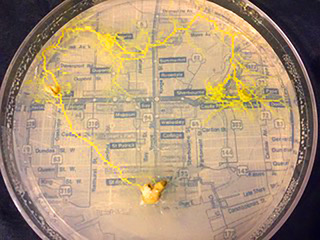During this workshop, Tosca Terán introduces the amazing potential of slime mould for collaboration at the intersection of art and science. Participants learn how to transform their kitchens and closets in to safe, mini-Physarum biolabs and leave the workshop with a feeding and growing kit, their own Slime mould, as well as a wide array of possibilities of slime mould (Physarum polycephalum*) culturing. The workshop invites participants to experiment with different biological media and feeding substrates, reflecting on how they inform the growth and morphology of protozoans and protists.
*Physarum polycephalum is a yellow ameboid dweller of decaying logs and decomposing vegetation on dim forest floors. It made headlines when Japanese biologists demonstrated its uncanny ability to optimize paths through mazes and reproduce tracks between mapped Tokyo railway stations. Since then, slime mould has become an attractive living substrate for research in diverse areas such as mathematical modeling, computation and bio-art.
Program Dates: November 13th & 14th @ 10am–1pm
Image Credit: Tosca Terán, Physarym polycephalum & the TTC, 2019. Courtesy of the artist.
Link: https://soundcloud.com/nanotopia/episode-3-special-guest-physarum-polycephalum

259 Lake Shore Blvd East
259 Lake Shore Blvd East
Toronto ON
M5A 3T7
November 13 – November 14
Bio
Tosca Hidalgo y Terán (born in San Francisco, CA, USA; lives in Toronto, ON, Canada) is an interdisciplinary artist. Her work has been featured at SOFA New York, Culture Canada, and The Toronto Design Exchange. Tosca has been awarded artist residencies with The Ayatana Research Program in Ottawa and The Icelandic Visual Artists Association through Sím, Reykjavik Iceland. In 2019 she was one of the first Bio-Artists in residence at the Museum of Contemporary Art Toronto in partnership with the Ontario Science Centre. Terán is the recipient of the 2019 BigCi Environmental Award at Wollemi National Park within the UNESCO World Heritage site in the Greater Blue Mountains. Tosca started collaborating artistically with Algae, Physarum polycephalum, and Mycelium in 2016, translating biodata from non-human organisms into music.
